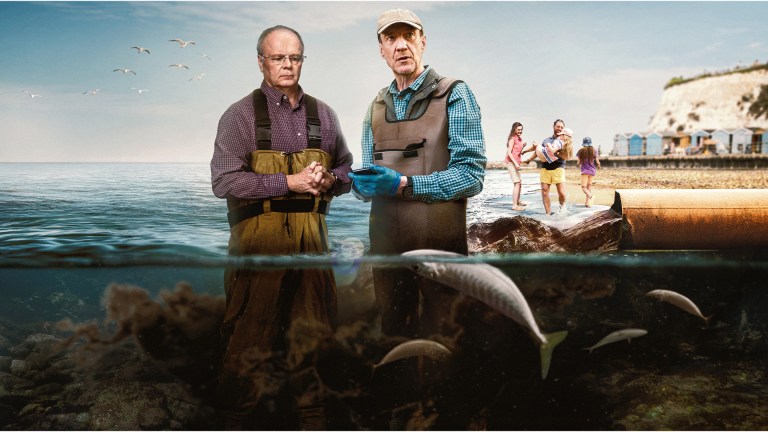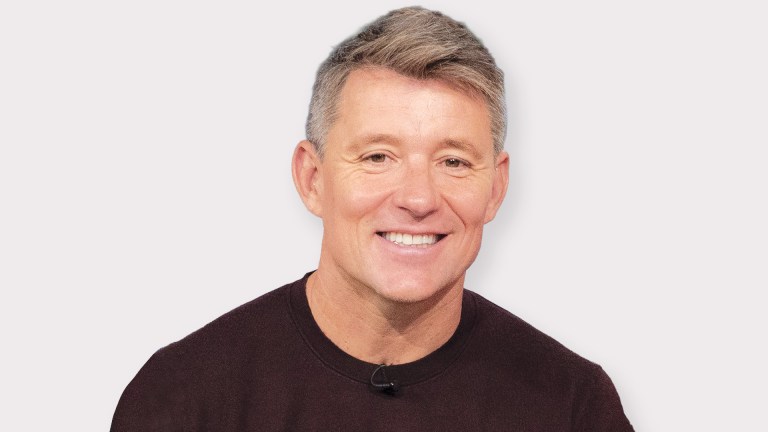She also co-hosted Netflix’s official Heartstopper podcast – a cute companion to the coming-of-age series about an LGBTQ+ friendship group – and launched a podcast of her own, The Final FronTia with Tia Kofi. Each week, she gets to indulge her twin passions for drag and sci-fi.
In fact, her main aim for 2025 is to “pop up in a couple of episodes” of Doctor Who, not least because she’s a big fan of Ncuti Gatwa’s cool young Time Lord. “I can scream at a Sontaran. I can point as the moon comes crashing towards us. And I can run away successfully. So I’ve got quite the range of acting ability in that respect,” Tia says drolly.
In October, Tia Kofi’s career got another boost when she was given a breakthrough award by LGBTQ+ magazine Attitude. Here, she looks back on a year that contained some huge personal highs, but also testing times for the community she’s proud to represent.
So, how has winning Drag Race changed things for you this year?
It’s interesting, because when I was ‘Baroness Basic’ from season two, I never experienced any negativity from the fandom. But now, having won the show, I finally have experienced quite a lot of that. At first it really took me aback, but now I’m like: ‘Oh, that’s just something that comes with succeeding – people want to tear you down.’ So I kind of wear it as a little RuPeter badge of honour. But it has changed things in terms of work. I get to say that I’m the winner of RuPaul’s Drag Race: UK vs the World, and no one can take that away from me.
What kind of negativity do you get from the fandom?
Advertising helps fund Big Issue’s mission to end poverty
Oh, the usual. Unfortunately, quite a lot of it did have racist connotations in the language that was used. That’s something I don’t shy away from talking about, because it’s very real and very prevalent, especially at the moment when people seem to default to that kind of behaviour. When they see difference, they tend to latch onto it and use it as a talking point – as a reason to tear someone down and attack them.
But where there is that negativity, there’s also overwhelming support and genuine kindness from people who watch the show. Drag Race is such an important window for people to see themselves reflected on screen, and it’s now gone entirely across the world. I mean, they’ve literally just announced that they’re doing Drag Race South Africa, so I believe the last continent left is Antarctica because they’ve covered the rest of them now.
Do you think drag is mainstream now?
Now that’s fascinating, because yes, it’s on television, and we’ve got drag performers winning awards and walking red carpets and appearing on the biggest TV shows in the UK. But there is something about drag that always sort of subverts people’s expectations. There’s always something a little bit punk about drag as a concept. I mean, Lily Savage hosted mainstream TV shows when I was growing up and you’ve always had the panto dame in pantomimes. So the mainstreaming of drag was always there – it’s part of British entertainment at its core – but it’s always still a little bit punk.
You also hosted the official Heartstopper podcast this year. Why do you think that show has struck such a chord with young queer kids in particular?
Because it’s all about demystifying things. When I was younger, I don’t think I had anything that really showcased LGBTQ+ things in my age group or made me feel represented or reflected. It sounds ridiculous, but that’s literally where my love of reality television has come from. When Big Brother started, there was a mixed-race girl called Mel [Hill] on the first series. And in my life in deepest, darkest Essex, I’d only ever seen me and my sister who looked like that, so that was wild to me.
Advertising helps fund Big Issue’s mission to end poverty
And then the second series was won by Brian Dowling. And I was like, “Hang on a second. That’s a homosexual – and I think maybe I’m the same.” So all these people who may not necessarily have understood at the time what they were doing and what they represented, still had such an important space, because we didn’t have things like Heartstopper and these things weren’t as openly discussed.
What is the big issue for LGBTQ+ people right now?
The level of allyship that the trans community needs at this moment in time is very important. Things have shifted to the right, and certain conversations have become talking points that politicians are using to leverage people into voting for them. Trans people have become one of those talking points and it’s quite dehumanising, I imagine, for them to feel like they’re just a way for people to convince the electorate to ignore important political issues of the day.
[Politicians are] having conversations about where people pee or what their pronouns are instead of addressing the massive increase in child poverty in the UK or the crazy disparity in terms of distribution of wealth. Politicians are using the smallest groups of minorities to say “look over there!” – as Jaida Essence Hall once said. That’s a [distraction] tactic, and it’s utter bollocks. So we do need to stand side by side with trans people more than ever.
New episodes of The Final FronTia with Tia Kofi launch weekly on all major podcast platforms.
Do you have a story to tell or opinions to share about this? Get in touch and tell us more. This Christmas, you can make a lasting change on a vendor’s life. Buy a magazine from your local vendor in the street every week. If you can’t reach them, buy a Vendor Support Kit.
Advertising helps fund Big Issue’s mission to end poverty









